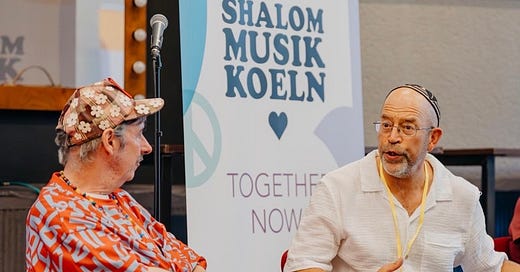Dear Friends,
One of the great gifts thus far of retirement has been my ability to say yes when unexpected opportunities arise. And so this past week I participated in the Shalom-Musik.Koeln festival in Cologne, Germany. I was fortunate to travel with my wife Ellen Jahoda and my friend and musical collaborator bassist Robert Bard. It was a powerful and unforgettable experience.
This was my third trip to Germany over the past 15 years. Each time I have come here, I have encountered many German citizens who feel personally responsible for the horrors that Germany perpetrated against the Jews during the Nazi regime and who have committed themselves to making whatever amends they can. I have also witnessed a nation that has done much to take responsibility for its past crimes. I have come away from each of these visits feeling supported and heartened, and this time was no exception.
As in so much of the world, antisemitism in Germany has spiked since Hamas’ deadly invasion of Israel this past October 7 and the war that followed. Many Jews in Germany are feeling unsafe as the surging anti-Zionism of the far Left and the ever-present poison of the neo-Nazi far Right press in from opposite sides of the political spectrum. The Shalom-Musik Festival, only a few years old, was created to celebrate the breadth of Jewish culture in Germany, and to make it visible to the general public. This year the organizers wrestled with how to stage the festival, and even whether to hold it at all. Ultimately they decided that the show must go on: rather than merely defend Jews and Jewish culture, this should be the moment to celebrate Jewish life. Nathanael Liminski, the State of North Rhine-Westphalia Minister for Federal and European Affairs, expressed this in his Shalom-Musik Festival’s endorsement letter: “Countering hatred with humanity. Making the silenced sound again. Strengthening solidarity and cohesion, here and now. That is the order of the day and the motto of this year’s festival edition: ‘Together now’.”
My duties began early on Friday evening, as I participated in a panel discussion entitled “What Is Jewish Music?” The panel was held in the lobby of a theater, because later that evening there would be a Yiddish cabaret concert by native Berlin artist Sharon Brauner, who is Jewish, and her band the Goy Boys. But since the events were taking place on Friday evening, Robert had suggested to the festival organizers that we could lead a Kabbalat Shabbat service prior to the concert in order to welcome Shabbat, and also to set a welcoming tone for the festival. The organizers loved this idea. They procured candles, challah, and grape juice and printed out an abbreviated service that I prepared. We set up in the small lobby, expecting perhaps fifty participants. More than 300 people poured in. Improvising, we moved into the theater space, and every seat filled. Most of the crowd was not Jewish, but there was a significant smattering of Jews from the Cologne synagogue and elsewhere who were thrilled that a public Shabbat celebration was happening in their city. It was clear that everyone felt a hunger and a yearning to share a Jewish ritual together.
I had no microphone, and was grateful that I can still be very loud. We turned on the house lights and I explained that, despite being in a theater, Robert and I were not performers and they were not the audience. Rather, all of us together were about to create a sacred space and enter sacred time. And the magic of Shabbat happened. We welcomed one another and then we welcomed the Angels of Peace and then we welcomed the holy Presence of Shabbat. However briefly, we laid down our burdens, breathed deeply, turned our focus to the wonder and goodness of being alive, and felt ourselves as one. We closed with prayers for peace. Shabbat is a gift, waiting for us every week.
Sunday was our performance day, the busiest day of the festival. Multiple free short concerts were being performed in venues all around the center of Cologne. Participants were encouraged to walk from site to site and take in a huge variety of Jewish music throughout the day. Robert and I had crafted a 25-minute set that we titled “The American Jewish Songbook.” Our performances were enthusiastically received.
The ”Long Day of Jewish Music,” as the organizers called it, had begun at noon with the cantorial concert at the synagogue. It culminated at 10pm with a gorgeous and acoustically astonishing performance of shofar and organ in the Dom, the cavernous Cologne Cathedral, which is the largest cathedral in Europe. Introducing the concert, the bishop in charge of the cathedral welcomed the Jewish community. Thomas described to me, with well-deserved pride, the long and patient path that he and his colleagues had traveled building relationships both with the church hierarchy and with the small and insular Cologne Jewish community that had led to this day. This was the first time that the Cologne Cathedral had ever collaborated with and welcomed the Jewish community. Music, the universal language, was the medium that brought us all together. I have never felt more powerfully the capacity of art to build bridges and to transcend boundaries.
I return from the Shalom Muzik Festival renewed and reinvigorated by the determination of its organizers to focus on music and culture as a tool for societal transformation. I am inspired by their courage in mounting the festival during a time of rising antisemitism, by their determination to support Jews and to celebrate Jewishness, and by their conscious decision to counter prejudice and hate with beauty and joy.
Shalom,
Rabbi Jonathan Kligler





I visited Cologne once in 1979. Seems like, from your experience, a very different place.
What an amazing experience for both you and the "kehillah" creating a sacred space to welcome Shabbat. What a blessing it must have been to be a part of it!